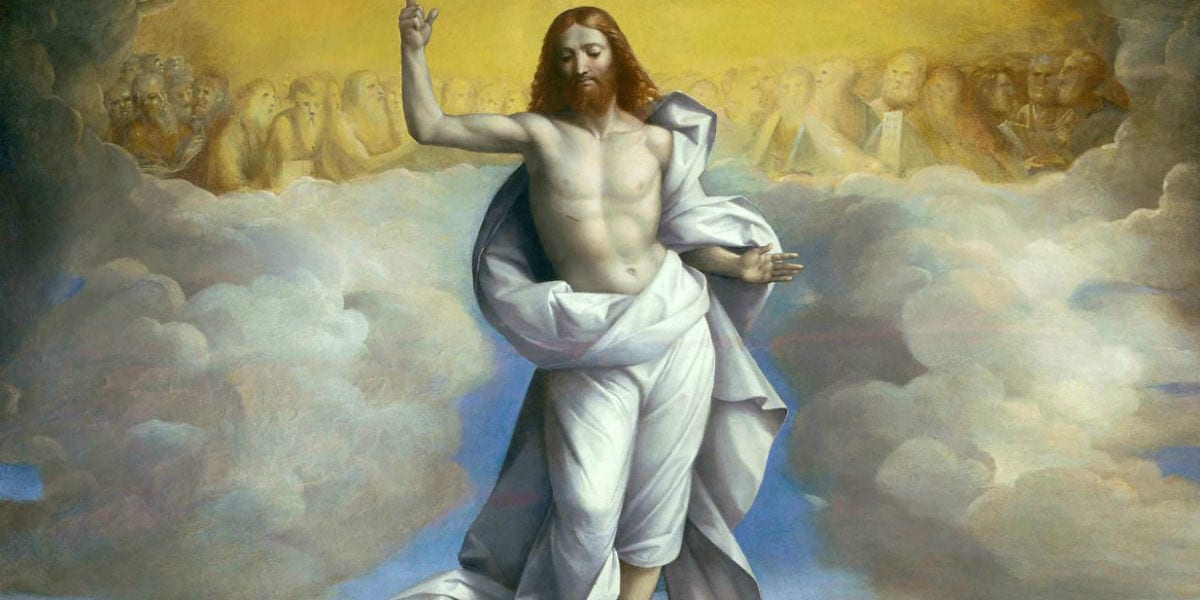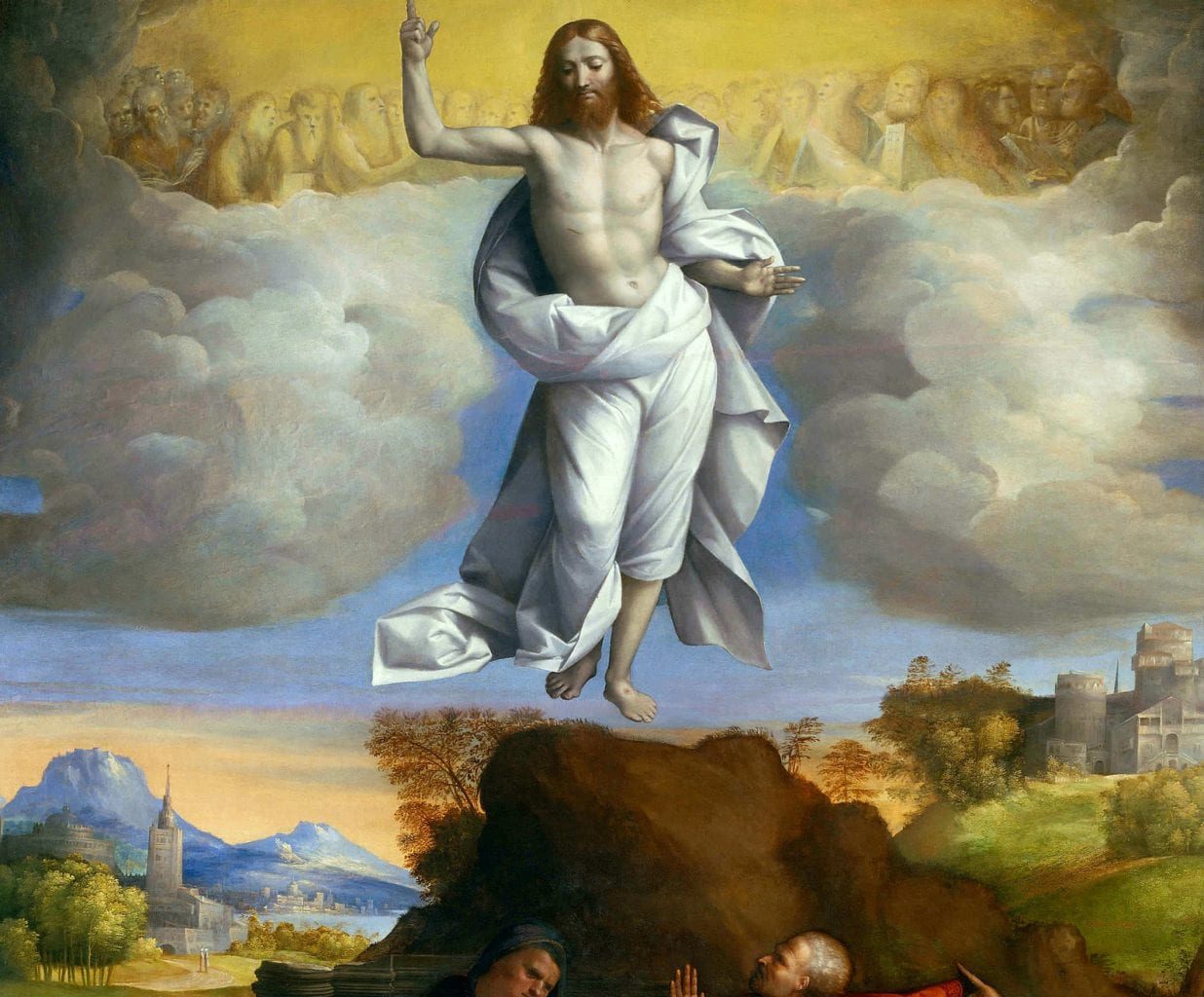Pope Leo XIV – Inaugural Mass Homily
Elected on May 8, 2025, as the 267th successor of St. Peter, Pope Leo XIV’...

This post is also available in: Spanish, Italian
The Solemnity of the Ascension celebrates many things, among them the Great Commission to preach the gospel to all nations. Thus, it is a fitting time to ponder the call of Pope John Paul II to a “new evangelization.” To LISTEN to this post read by Dr. Italy, click on the play arrow on the left directly below this paragraph.
The celebration of the Ascension used to leave me a bit flat. It was clear what Good Friday did for me. And Easter Sunday’s benefits were indisputable. But as for the Ascension, what’s in it for me?
Christianity is about a kind of love we call agape or charity. It is love that looks away from itself to another and gives itself away for another. The Divine Word did not become man or endure the cross because something was in it for Him.
Charity shares in the beloved’s joys and sorrows (John 14:28). The first thing to remember about the Ascension is that it is about sharing in Jesus’ joy. It is about celebrating his return to the heavenly glory to which he refused to cling (Phil 2:6-11). It is about rejoicing that his crown of thorns has been replaced with the kingly crown, that the mocking crowd at Calvary has been replaced with myriads of adoring angels.
The Ascension is about Jesus’ triumph and glorification. If we get our attention off ourselves and allow the Holy Spirit’s love of the Son to animate our souls, we’ll experience greater joy than when we see our child hit a home run or graduate from college.
But the Ascension is not just about charity. It is also a feast of hope. Yes, there is something in it for us. He goes to prepare a place for us (John 14:2). We will also one day wear crowns made of gold instead of thorns.
For us to endure until that blessed moment, we need divine power. That’s another reason we ought to rejoice in his Ascension. He takes his place at God’s right hand so that he can pour out the promise of the Father, the Holy Spirit, upon his disciples (Ephesians 4:10).
As he ascends, he tells the disciples to wait for this power. But notice that he does not tell them to wait passively for the rapture. He does not instruct them to pour over Bible prophecies, debating about how and when he will return. In fact in Acts 1:11, after the Lord ascends out of their sight, the angels ask why the disciples just stand there, staring into space.

The waiting is not to be a squandering of precious time. It is waiting for a purpose, nine days of prayer (the first novena!) leading to empowerment. Why empowerment? Because they have challenging work to do. “Go, therefore, and make disciples of all nations.” (Matthew 28: 16-20).
We used to think that evangelization was something that happened in mission countries far away, carried out by priests and religious. But the Second Vatican Council told us that our own neighborhoods are mission territory, and that every single Catholic is called to be an evangelist. Pope John Paul II proclaimed this as the “New Evangelization” because the place is new–right next door–and the missionaries are new since they include all us all.
I’m really not sure that St. Francis of Assisi ever said “Preach the Gospel always; when necessary, use words.” But if he did, note this–Francis often thought it very necessary to use words. His words could be heard in marketplaces, on street-corners, in Churches, wherever there were people.
Of course, preaching without an authentic witness of life is certainly counterproductive. But forget about the idea that just the witness of our lives is enough. It is not. You may not be called to preach on street corners, but Vatican II and subsequent popes, echoing 1 Peter 3:15, say that we all must be ready to articulate what Jesus has done for us, what he means to us, and why he is the answer to the world’s problems.
Feel inadequate to the task? You’re in good company. Pope Benedict’s first public statement was an admission of his inadequacy. Do as he does–pray for the power of the Holy Spirit to move in and through you, and take the time to keep learning more about your faith so that you can share it with ever greater confidence.
For more resources for the Easter Season, see the EASTER section of the Crossroads Initiative Library.
This article on the Ascension, hope, charity, and the new evangelization is a reflection on the readings for the Solemnity of the Ascension, cycle A (Acts 1:1-11; Psalm 47; Ephesians 1:17-23, Matthew 28:16-20). However, it is also appropriate for years B & C since the only change in the readings is the gospel: Year B it is taken from Mark 16:15-20 and year C from Luke 24:46-53.
The readings for the Seventh (7th) Sunday of Easter, where the Ascension is celebrated on Thursday, are Acts 1:1-11; Ps 47; Eph 1:17-23; Mt 28:16-20.
Banner/featured image The Ascension by Benvenuto Tisi. Public domain.
Sister Rita Hanna
Posted at 10:09h, 12 MayThis is a excellent teaching on the Ascension.. I plan to share it with the new Catholics that entered the Church at Easter. Thank you.
Dr. Marcellino D'Ambrosio
Posted at 11:46h, 12 MayThanks so much for the encouraging feedback, Sr. Rita. So glad you find this post helpful.
Joseph JJ Visci
Posted at 21:43h, 28 MayExcellent reflection and insight into the Ascension, and well said too!